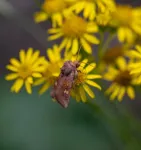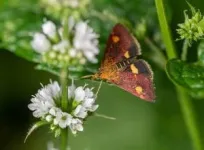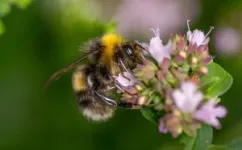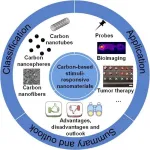(Press-News.org) Night-time pollinators such as moths need protecting as effectively as bees, as new research found they could be less resilient to the pressures of urbanisation
Moths account for a third of the pollinator visits to crops, flowers and trees in urban areas
More moths were found to be carrying pollen than previously thought, and visiting more types of plant and fruit crops than previously identified
Moth abundance has declined by 33 per cent in the last 50 years and this represents a threat to the plants and crops that rely on insects for pollination
Night-time pollinators such as moths may visit just as many plants as bees, and should also be the focus of conservation and protection efforts, a new study from the University of Sheffield suggests.
The study found that moths under pressure from urbanisation may also be less resilient than bees, due to their more complex life cycle and more specific plant requirements.
It also revealed that despite this threat, moths play a crucial role in supporting urban plant communities, accounting for a third of all pollination in flowering plants, crops and trees.
The researchers suggest that when planning or redeveloping urban areas, supporting the introduction of plant species that are beneficial for moths, as well as bees, will become increasingly important for the health of urban ecosystems.
Dr Emilie Ellis, lead author from the University of Sheffield’s Grantham Institute for Sustainable Futures, and now the Research Centre for Ecological Change (REC) at the University of Helsinki, said: “Our study found that in more urbanised areas the diversity of pollen being carried by moths and bees decreases, meaning that urban pollinators may have less flower resources available to them.
“As moths and bees both rely on plants for survival, plant populations also rely on insects for pollination. Protecting urban green spaces and ensuring they are developed in such a way that moves beyond bee-only conservation but also supports a diverse array of wildlife, will ensure both bee and moth populations remain resilient and our towns and cities remain healthier, greener places.”
In the study, Dr Ellis and her co-authors showed that bees and moths are visiting significantly different plant communities. Along with the usual pale and fragrant flower species moths are known to frequent, the study showed that moths were found to be carrying more pollen than previously thought, and visiting more types of tree and fruit crops than previously identified.
In urbanised areas, there can sometimes be an overabundance of non-native plant species, or just an overall reduction in the diversity of plant species; this may result in lower insect interactions for less attractive plant species, having negative effects on both plant and insect populations.
Dr Ellis says the research demonstrates just how crucial moths are at pollinating plants, including crops, and that the study has implications for wildlife-friendly gardening initiatives, urban planners and policy makers responsible for developing urban green spaces for parks or urban horticulture.
Dr Ellis said: “People don’t generally appreciate moths so they can often be overlooked compared to bees when talking about protection and conservation, but it's becoming apparent that there needs to be a much more focused effort to raise awareness of the important role moths play in establishing healthy environments, especially as we know moth populations have drastically declined over the past 50 years.
“When planning green spaces, consideration needs to be given to ensure planting is diverse and moth-friendly as well as bee-friendly, to ensure both our plants and insects remain resilient in the face of the climate crisis and further losses.”
Dr Stuart Campbell, from the University of Sheffield’s School of Biosciences, and a senior author on the study, said: “Most plants depend on insects for pollination, but knowing which insects do the pollinating is actually a really difficult question to answer. There are about 250 species of bee in the UK, and we know quite a bit about some of these species, but we also have over 2,500 species of moth which visit flowers mostly at night. So, as you might expect, we know a lot less about these.
“What we were able to do in this study is use DNA sequencing to identify the pollen that gets stuck to night-flying moths when they visit flowers. We found that moths are probably pollinating a range of plant species, many of them wild, that are unlikely to be pollinated by bees - and vice versa. It's clear from this study that pollination is achieved by complex networks of insects and plants, and these networks may be delicate, and sensitive to urbanisation. We can also learn which plant species might be the best sources of food for different insects, including nocturnal ones like adult moths, and use that information to better provide for all our pollinators".
ENDS
Media contact: Shemina Davis, Senior Media Relations Manager, 0114 222 5339 or shemina.davis@sheffield.ac.uk
Notes to editors:
Read the full paper at: https://onlinelibrary.wiley.com/doi/10.1111/ele.14261(will be live following embargo, please request if needed)
Images available for use, please contact the media officer above.
The University of Sheffield
The University of Sheffield is a leading Russell Group university, with a world-class reputation. Over 30,000 students from 150 countries study at Sheffield. In a truly global community, they learn alongside over 1,500 of the world’s leading academics.
Sheffield’s world-shaping research feeds into its excellent education. Students learn at the leading edge of discovery from researchers who are tackling today’s biggest global challenges.
Driven by outstanding people, staff and students share a commitment to changing the world for the better, through the power and application of ideas and knowledge.
From the first documented use of penicillin as a therapy in 1930, to building Europe’s largest research-led manufacturing cluster, Sheffield’s inventive spirit and top quality research environment sets it apart.
Current research partners include Boeing, Rolls-Royce, Unilever, AstraZeneca, GlaxoSmithKline, Siemens and Airbus, as well as many government agencies and charitable foundations.
Sheffield’s Students’ Union has won the Whatuni Student Choice Award for Best Students’ Union for six consecutive years. Students can choose from 350 societies and clubs, or join over 2,000 volunteers.
Over 300,000 Sheffield alumni from 205 different countries make a significant influence across the world, with six Nobel Prize winners included amongst former staff and students.
To find out more, visit: www.sheffield.ac.uk
END
Saving moths may be just as important as saving the bees
2023-06-05
ELSE PRESS RELEASES FROM THIS DATE:
Deadly heart attacks more common on a Monday
2023-06-05
Serious heart attacks are more likely to happen at the start of the working week than at any other time, according to new research presented today at the British Cardiovascular Society (BCS) conference in Manchester.
Doctors at the Belfast Health and Social Care Trust and the Royal College of Surgeons in Ireland analysed data of 10,528 patients across the island of Ireland (7,112 in the Republic of Ireland, 3,416 in Northern Ireland) admitted to hospital between 2013 and 2018 with the most serious type of heart attack. This is known as an ST-segment elevation myocardial infarction (STEMI) and occurs when a major coronary artery is completely blocked.
The researchers ...
Testing for ‘zombie cells’ could boost number of hearts for transplant
2023-06-05
Testing older potential organ donors for dangerous ‘zombie’ cells could help to increase the number of hearts available for transplant, according to research part-funded by the British Heart Foundation (BHF) and presented at the British Cardiovascular Society conference in Manchester.
Currently, hearts from donors aged over 65 are not accepted for donation due to the likelihood of a poor clinical outcome. However, our hearts age at different rates and age isn’t necessarily the best indicator of heart health.
Researchers ...
Whales not to be counted on as ‘climate savers’: study
2023-06-04
Do whales increase the removal of carbon from the atmosphere?
Despite some hope that this would be the case, a new study led by Griffith University and a team of global researchers has found the amount of potential carbon capture by whales is too little to meaningfully alter the course of climate change.
Marine scientist Dr Olaf Meynecke and the team from the Griffith-led Whales and Climate Research Program including Professor Brendan Mackey and Dr Jasper De Bie, reviewed the primary ways in which baleen whales (such as humpback whales) removed atmospheric carbon ...
New drug delays progression of glioma, a deadly brain cancer
2023-06-04
Key takeaways
A targeted therapy drug called vorasidenib had positive results in delaying progression of a specific form glioma, a slow-growing but deadly brain cancer.
In a study of 331 people with the disease, the drug was effective in lengthening the period of time before the patients’ cancer worsened, and with no observed adverse effects.
New treatment approaches for glioma are needed because current treatments, including chemotherapy and radiation, can cause neurological deficits.
In ...
University of Sydney launches innovative research fellowship scheme to tackle global challenges
2023-06-04
An unprecedented investment by the University of Sydney, Australia will support up to 40 new continuing positions, empowering the world’s most talented emerging researchers to undertake innovative research to address some of the biggest challenges of our time.
A $100 million investment and a cornerstone of the University’s 2032 Strategy, the Sydney Horizon Fellowship scheme is the first of its kind in Australia and among the most generous university fellowships in the world.
“The Sydney ...
Real-world data suggests stopping immunotherapy after two years is reasonable in patients with advanced lung cancer
2023-06-04
CHICAGO – Over the past decade, the approval of immune checkpoint inhibitors has revolutionized treatment for patients with advanced lung cancer, helping many live longer lives and improving overall survival for the disease. However, an important question has remained unanswered: How long should a patient with advanced non-small cell lung cancer (NSCLC), who receives immunotherapy as part of their initial treatment, continue with treatment?
A new retrospective cohort study, published today in JAMA Oncology and presented at the 2023 American Society of Clinical Oncology (ASCO) Annual Meeting (Abstract ...
Association of immunotherapy duration with overall survival in advanced non–small cell lung cancer – this study is being released to coincide with a poster presentation at the 2023 ASCO annual meeting
2023-06-04
About The Study: The findings of this study provide reassurance that for patients with advanced non–small cell lung cancer whose disease is still responding to immune checkpoint inhibitor therapy at two years, stopping therapy and monitoring rather than continuing immunotherapy indefinitely is a reasonable strategy with sustained clinical benefit.
Authors: Lova Sun, M.D., M.S.C.E., of the Perelman School of Medicine at the University of Pennsylvania in Philadelphia, is the corresponding author.
To access the embargoed study: Visit our For The Media website at this link https://media.jamanetwork.com/
(doi:10.1001/jamaoncol.2023.1891)
Editor’s ...
The promise of novel FolRα-targeting antibody drug conjugate in recurrent epithelial ovarian cancer
2023-06-03
Presented today by VHIO’s Ana Oaknin at the 2023 ASCO Annual Meeting, 2-6 June (Chicago, IL), updated dose expansion data of the STRO-002-GM1 global phase I study* show promise of FolRα-targeting antibody drug conjugate (ADC) luveltamab tazevibulin in patients with recurrent FolRα-expressing epithelial ovarian cancer.
80% of patients included in this study presented with FolRα expression levels higher than 25%. The overall response rate among these patients was 43.8% in the dose expansion cohort, with a median duration of response ...
Carbon-based stimuli-responsive nanomaterials: classification and application
2023-06-03
Carbon-based stimuli-responsive nanomaterials are gaining much attention due to their versatility, including disease diagnosis and treatment. They work under endogenous (pH, temperature, enzyme, and redox) or exogenous (temperature, light, magnetic field, ultrasound) stimuli. Carbon-based stimuli-responsive nanomaterials can be used as smart materials with dynamically tunable physicochemical properties in response to changes in internal or external environmental stimuli. Their diverse combinations of nanostructures and molecular designs, as well as functional ...
ASCO: Targeted therapy induces responses in HER2-amplified biliary tract cancer
2023-06-03
ABSTRACT: 4008
CHICAGO ― HER2-targeted bispecific antibody zanidatamab demonstrated durable responses in patients with treatment-refractory HER2-positive biliary tract cancer (BTC), researchers from The University of Texas MD Anderson Cancer Center reported at the 2023 American Society of Clinical Oncology (ASCO) Annual Meeting. The study results also were published today in The Lancet Oncology.
In the first cohort of the global Phase II HERIZON-BTC-01 trial, which included 80 patients with HER2-positive tumors, the confirmed objective response rate (cORR) was 41% with a median duration of response (DOR) of 12.9 months at a median follow-up of 12.4 months. ...






